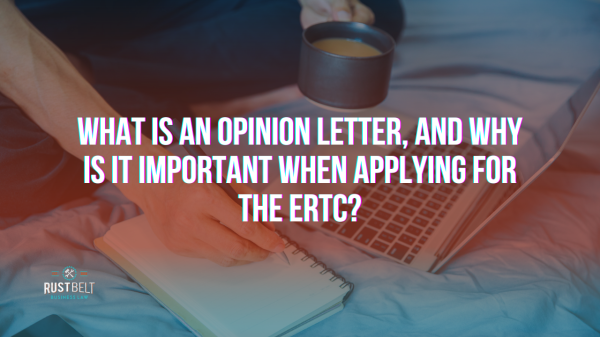Small business owners have been hit hard by the COVID-19 pandemic. In an effort to help struggling businesses, the federal government has implemented a number of relief programs, including the Employee Retention Tax Credit (ERTC).
The Importance of Obtaining an Opinion Letter
While the ERTC can provide much-needed financial relief, it can be difficult to navigate the application process. This is why it's critical for business owners to obtain an opinion letter from an attorney when applying for the credit.
An opinion letter is a formal document that provides legal advice and guidance on a particular issue, in this case, the ERTC. It serves as a formal legal document that can provide assurance and guidance on complex legal issues, and it may be required in a variety of legal contexts. Obtaining an opinion letter from an attorney can help ensure that your application is accurate and complete, and can help prevent costly mistakes.
Risks of Misinterpreting Eligibility Criteria
One of the biggest risks of applying for the ERTC without an opinion letter is the risk of misinterpreting the eligibility criteria. The eligibility criteria for the ERTC are complex and can be difficult to understand. This is especially true for small business owners who may not have experience in tax law.
Misinterpreting the eligibility criteria can lead to a number of problems. For example, if you mistakenly believe that your business is eligible for the credit when it's not, you may be subject to audits and penalties down the line.
Missing Out on Available Credits
Another risk of not obtaining an opinion letter is the risk of missing out on available credits. The ERTC is a refundable tax credit that can provide up to $5,000 per employee for eligible employers. However, if you don't apply correctly or if you don't work with experts who understand the program, you may miss out on the full amount of credits available to you.
Risks of Working with a Non-Expert
Some business owners may believe that they can apply for the ERTC with the help of an accountant or someone else who is not as well-versed in the program. While an accountant may be able to provide some guidance on the application process, they may not have the legal expertise necessary to provide an opinion letter or to ensure that your application is accurate and complete.
Working with an accountant or non-expert can also lead to misinterpretations of the eligibility criteria, missing out on available credits, and other costly mistakes.
Costly Audits and Penalties
If you don't obtain an opinion letter or if you don't apply correctly, you may be subject to audits and penalties down the line. Audits can be time-consuming and costly, and penalties can add up quickly.
By obtaining an opinion letter from an attorney and working with experts who understand the ERTC program, you can help prevent audits and penalties, and can ensure that your application is successful.
Benefits of Working with Our Law Firm for Your ERTC Application
By working with our law firm, you can benefit from our legal expertise and experience with the ERTC program. We can help you navigate the application process with confidence, and can ensure that you receive the full amount of credits available to you.
In addition to providing the opinion letter you need, we can also work with your accountant or other financial advisors to ensure that your application is accurate and complete. We can provide guidance on eligibility criteria, documentation requirements, and other important aspects of the ERTC program.
Our goal is to help you obtain the financial relief you need to keep your business running during these difficult times. Contact us today to learn more about how we can help you apply for the Employee Retention Tax Credit.




